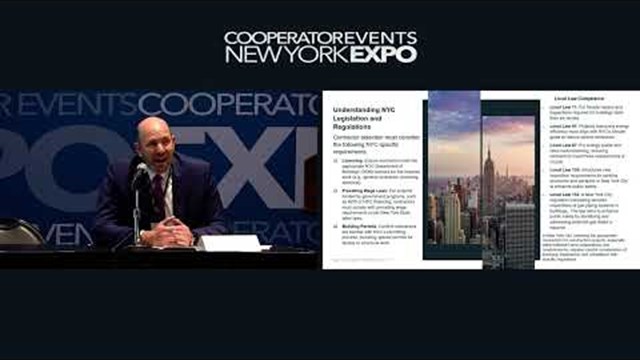At the heart of volunteerism is the notion of doing something for the common good. For many, choosing to live in a co-op or condo community is also choosing to volunteer for board service, helping to guide and govern the community they call home. But with that impulse to serve the common good lurks the possibility of liability - a concern that stops many from wanting to participate in the governance of their building or association. Fortunately, that’s where directors and officers —commonly called simply D&O - insurance comes in.
What’s D&O?
In a nutshell, directors and officers insurance is a form of liability coverage that protects board members of a corporation or association against losses or advancement of defense costs in the event that a decision made in good faith results in damages of some sort.
“Directors and Officers insurance coverage is a type of insurance coverage available to cooperative, HOA and condominium boards generally intended to cover claims against board members and/or officers for alleged errors and omissions and/or breach of fiduciary duties. It’s a type of coverage that’s purchased in addition to the other insurance normally carried,” says Mark Hakim, an attorney with New York City-based law firm Schwartz Sladkus Reich Greenberg Atlas.
However, Hakim is quick to note that D&O is not carte blanche for boards to act with impunity. That bit about ‘decisions made in good faith’ is very much key. “Each such officer or board member may be held personally liable for actions not taken in good faith, or taken outside the scope of their duties,” says Hakim, “including but not limited to discrimination, self-dealing, retaliation, etc. D&O insurance coverage is generally only afforded if the alleged conduct of the board member or officer was within the scope of their duties, performed in good faith, and without gross negligence.”
Within those parameters, Hakim continues, “The importance of D&O insurance cannot be overstated. The presence of such insurance permits members or officers, each of whom are unpaid volunteers, to freely participate in corporate governance without fear of personal liability for merely exercising their jobs in good faith. It is difficult at times to get people to serve on boards, and absent this protection, it would be even more difficult. D&O is not a luxury—it’s a necessity when serving on a board.”
Wayne Dow is vice president for Preferred Property Programs, a Baldwin Group partner based in Rhode Island. The insurance company is based in Holmdel, New Jersey and writes policies nationally. “The easiest way to describe D&O insurance when I’m explaining it to board members is that it’s ‘sleep insurance.’ It gives them the ability to sleep at night. D&O coverage protects their personal assets if they are sued and claims made against them as volunteer board members for their community association. D&O is there to protect the volunteer board members. If there is a suit, you as a board member can only be sued in your capacity as a board member. Your personal assets are protected.”
Jay Dixon, a senior director with OnePoint Insurance, a national insurance brokerage with offices in New York City, says, “Directors and Officers Insurance and Employment Practices Liability Insurance (EPLI) are crucial parts of the insurance plan for boards of cooperatives and condominiums. These coverages provide financial protection for board members, officers, and volunteers against claims and financial risk if they are sued for decisions made and/or actions taken while performing their official duties. D&O encourages participation in the community, because board members and prospective board members know they are protected.
What’s Covered & What’s Not
Almost any decision made by a board can potentially lead to allegations of breach of fiduciary duty, mismanagement, or employment practices violations. For example, decisions such as not approving a potential buyer in a cooperative, terminating a contract with a vendor, or an employee’s dismissal can expose the board to legal liabilities and lawsuits. “D&O insurance helps mitigate the financial risks when lawsuits do arise,” says Dixon. “Legal defense costs, settlements, and judgments can be financially devastating, and D&O insurance covers these expenses, protecting the co-op or condo’s financial health.”
Coverage Amounts & Other Pertinent Points
Much like other types of insurance, premiums for D&O coverage are determined by various factors, including the corporation or association’s past claims history, the number of units in the community, the number of board members, the average value of units in the building, the condition of the community’s finances, and whether the association operates at a profit or a deficit. Given how variable all those factors are from community to community, there is no ‘average’ premium; the premium is specifically underwritten according to the individual characteristics of the exposure.
Policy premiums and retention amounts also vary by state and jurisdiction. For example, “The premium for a D&O policy on a 200-unit co-op in Manhattan is more than it would be for a suburban 200-unit HOA in Dallas, Texas,” says Dow. “Pricing is governed by the nature of risk. Also, limits are provided and can be guided by a community’s governing documents.”
According to Dixon, “Every board should have D&O insurance; the governing documents of the association normally mandate it. We typically advise our clients to secure $1 to $2 million in D&O coverage with ‘defense costs outside the limits.’ This means the costs of defending a claim do not reduce the actual limit available to pay the claim. Some excess liability and umbrella policies can include D&O coverage, providing additional limits for D&O claims.”
D&O insurance is critical for all shared interest communities, and serves more than one purpose. While there to protect decision makers, it’s also there to mitigate the concerns of those same decision makers about their personal liability when stepping forward to volunteer. It’s the peace of mind that makes volunteer service possible.
A J Sidransky is a staff writer/reporter for CooperatorNews, and a published novelist. He may be reached at alan@yrinc.com.










Leave a Comment